#but the character and level designs are soo gorgeous whenever i see anything from the game!
Text
ngl all the hype for that elden ring (dlc?) on my dash makes me curious about it 👀
#i always found it's aesthetic impeccable but i feel like i will suck tremendously in this type of hardcore game so i always stayed away 😩#but the character and level designs are soo gorgeous whenever i see anything from the game!
2 notes
·
View notes
Text
Kdrama: 그냥 사랑하는 사이 Review
Foreword: The entire composition of this “rant” took me about 5 months to complete. This drama changed a part of me. That is all I have to say.
---
It hasn’t been a full 24 hours since I finished the last episode of this drama, and I may have not completely collected my thoughts yet, but I just want to make one point clear: it was a beautiful masterpiece that was simply too poignant, real, haunting, and raw for the world of kdramas.
This probably sounds like a terrible diss at the rest of the kdrama world, but to call this drama a kdrama, in my opinion, undermines its value. This show went beyond the boundaries of “normal kdramas” and brought us stories that are unpopular or just rarely addressed in the realm of kdramas in general.
To start off, I have a simple disclaimer, and it is that this drama is not for everyone. For some, it is too heavy, for others it is too slow. 그 사이 requires an open mind that is willing to absorb not only all the light, but all the dark, too. Because the brightest things tend to come out of the darkness.
Especially, towards the latter half of 그 사이, I began to cry really easily for every interaction that Kang-doo and Moon-soo had, for every event that made them a little more miserable or a little happier, for anything small or big in their lives. For the first time ever while watching something, I genuinely felt the pain of their worlds reflect onto mine, not because I necessarily related with them, but because their stories felt so real and tangible, that they were beginning to coincide with the stories of my own. Even up until the very end, although I thought it would be excruciatingly difficult for me to bid farewell to these characters and everything else they came with, I ended up feeling genuinely satisfied. Because, something about it, I didn’t feel like their stories actually ended there. It really does feel like Kang-doo and Moon-soo, and everyone else including Seo Joo-won, Jung Yoo-jin, Jung Yoo-taek, Ma-ri, Moon-soo’s mother, and Sang-man, too, are still living their lives somewhere far away from me right now in this moment. And to me, that was magical. Because whenever I finish a drama, especially a good one, I always felt extremely empty after its end. The withdrawal symptoms from amazing dramas are one of the hardest withdrawals to cope with. But after 그 사이, I of course felt regretful that it was over so fast, but I didn’t necessarily long to keep watching more and more, which probably sounds very odd, and maybe even bad.
But, no. Simply put, the way 그 사이 chose to wrap up these intricate storylines made everything feel overwhelmingly realistic. It wasn’t the ending of a story, but more like the closing of the curtains, the turning off of the cameras, and the end of the audience’s privileged priviness to their lives thus far. But the characters themselves, it didn’t feel like their stories ended anywhere close to there. I firmly feel like they are continuing. Just continuing.
How this drama managed to pull off such a clean finale, is something I will save to think about later. I know I am hopping around all over the place right now, but I felt that my post-finale thoughts had to be recorded promptly, before they drifted from me. Now, I want to back it up all the way to the end, to even before 그 사이 began to air. Oh, how grateful and glad I am to have noticed its uniqueness even prior to its actual premier. Of course, I didn’t exactly expect it to nearly change a part of me, but I had the slightest, really, just oh-so slightest inclination that this drama might contain all the elements that my heart has been searching for for so long.
After years of watching kdramas, one’s standards begin to naturally rise, and by today, I am definitely very picky with what I consider a “good” drama. Granted, everyone’s preferences are subjective, and my very own may be more specific than others’, but if anything, that probably enabled 그 사이 to rise in ranks faster than I ever expected.
Just from its posters, 그 사이 exuded a sort of ethereal calamity that most dramas don’t really go for these days. Everyone associated 그 사이 with the word “melo”. I am not sure if I completely agree with that description, because like the word “kdrama”, labeling 그 사이 as “melo” seems to undermine its value in a negative way. Melos have a stigma for being slow paced, dragged out, over-dramatic, and tear-filled for more than half the series. The most “melo” part of 그 사이 is the fact that its pace is definitely calmer; it didn’t rush into events and plot twists. But that is, in no way, a bad part of it. I will get back to its elements later. But trust me, slow added a gorgeous feat to 그 사이.
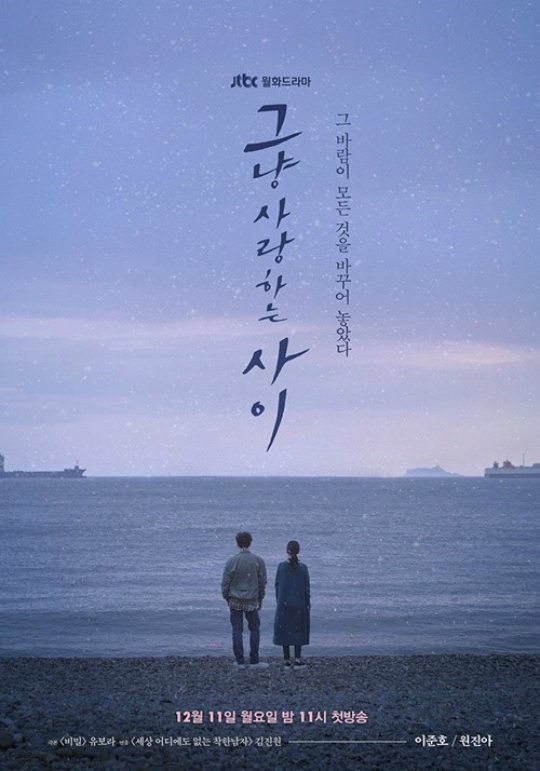
Going back to what I mentioned about the posters, specifically the one above, it felt like a movie. I had mentioned this to my friend, but upon watching the teasers and scrolling through a few images, the biggest thing that piqued my interest was that “it seriously looks like a movie!!!!”. Now, what I mean by “a movie” might sound pretty lame. However, personally, I am not a frequent moviegoer. In fact, I am barely a moviegoer at all. This is because I always felt overwhelmed by the end of movies, regardless of the genre. Movies were always so concise, impactful, and had the ability to leave a really strong, lasting impression within a really short amount of time. That sort of stuff always threw me off; it was just always too much for my brain to handle. Dramas and shows on the other hand, are way more subtle. I get to wean myself into the emotions and storylines, and there is an added level of depth simply due to the fact that they are longer than just an hour and a half or so.
And so, with 그 사이 giving me movie vibes, meant that I felt like it had plenty of room to hit me like a truck and leave me with a few scars, while at the same time, playing itself out as a 16-episode series. The prominent usage of cool colors, mellowed-down instrumental tones, wistful voiceovers, and a cityscape that wasn’t your classic, bright uptown Seoul, but instead a somber yet colorful Busan, all left a very strong, but refreshing first impression on me. It really looked like a movie. Its feats and details looked grand from the get go. It meant that I had a gut feeling that this show was really, seriously, going to move me. And it truly did.
initialization & continuation--
The very first episode, like most first episodes, introduced us to the one thing that this entire series basically revolves around: the mall collapse accident. I don’t want to exactly recap what the first few episodes were about, but more of what stood out to me that made 그 사이 feel much more special than anything else out there so far.
Moon-soo is a hard worker, balancing a lowkey, blue-collared “job” for her family, as well as working as a designer. Aside from the maybe flawed balance of “work” she has going on, 그 사이 decides to show us the mundane parts, too. Clips of her scrubbing the walls, sweeping the floors, building paper models, simply going about the daily rounds in her life. The initial portrayal of Moon-soo accomplished something that many dramas cannot really pull off, and that is that Moon-soo is just like you and me. Maybe not in the same exact occupational way, but she wakes up in the morning, maybe restlessly, maybe a little bit miserably, she does the things she needs to do, she tends to her responsibilities, and she simply carries on her with life. Of course, not everyone can relate to her on an emotional level, but in a way, we can relate to carrying on with our days no matter how hard it gets. We can see that Moon-soo isn’t that happiest soul in the world, but she isn’t oversensitive and extra mopey, either. She reflects a part of us that we can empathize with, to varying degrees.
The most prominent thing that I initially noticed about Kang-doo was his sharp tongue and the fact that he was always getting beat up and walking around with scars and blood stains. At first glance, many would probably assume that he was your classic, reckless bad boy that doesn’t give two shits about the world. And to an extent, that is true. However, we are also fully aware of the kind of ordeals he has gone through, and we could, or at least I could, sort of feel this underlying pain that he carries around within himself. The eternal scars that Kang-doo carries within himself still haunt me to this day. I can’t even begin to fathom, how hard it must be, to carry so much trauma within one’s own mind. I can’t even imagine how hard it must be to have your father die in an accident, to have been buried beneath rubble for 7 days, to have been stuck with a dead body, to have watched him die, to have your mother die promptly afterwards, to legitimately have schizophrenia due to the all these ordeals combined. In short, Kang-doo is fucked up in ways unimaginable to a normal person, but he hides it all away behind his cold eyes in a heavy layer of bruteness and disregard. From the very beginning, I could feel that Kang-doo’s character has so much complexity, to a point where I couldn’t even comprehend how deep the series would choose to dig out from him. I was excited, but at the same time, apprehensive to watch his story unfold. I knew I had to prepare myself for some massive waterworks. This, in itself, was something a drama had never presented to me with before. 그 사이, I could tell, would not be your cliche kind of romance story.
Even the opening, since the very first episode when I saw it, it pulled at something deeper than anything else. It is comprised of still frames of tragic accidents or sites of rubble and such. It is haunting for an opening and it definitely left a huge impression on me. It established a heavy aura that rarely any dramas dare to take on.

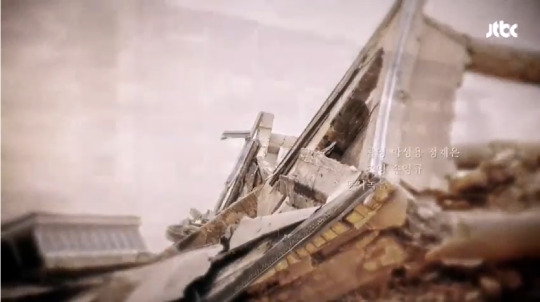
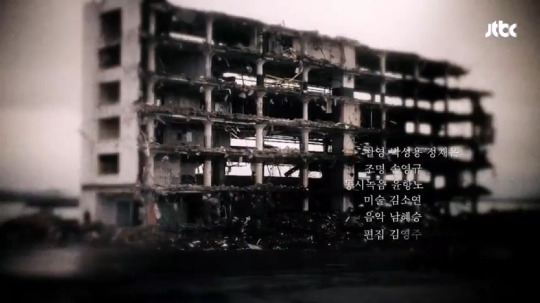


Another random but poignant point that stuck with me was the scene in which Halmoni was smoking, and she passes the cigarette to Kang-doo, who also takes a puff. We only see the back of their figures as they sit on swings, but when they turn their faces to the side, we can clearly see that it is the actors themselves smoking, and not some sort of lookalikes. This left a lasting impression because it almost felt shocking, to watch Jun-ho of 2PM smoke so blatantly like that. Korean media always heavily censors these kinds of things, even if it’s ingrained into their culture like smoking sort of is. Watching him smoke felt kind of scary, in a good way. It felt real, that yes, even someone who is a top idol that sings and dances and has to maintain some sort of pretty image 24/7, can and will smoke. So fun fact: kpop idols are humans, too!
The other characters as well, Wan-jin and Sang-man and Moon-soo’s mom, and Seo Joo-won, Jung Yoo-jin, Ma-ri and Jung Yoo-taek, and Halmeoni played their own special, but very symbolic role as 그 사이 progressed.
Since our introduction to Sang-man, we can get the gist that he is “not normal”. Once again, at first glance, Sang-man looks like a guy who is mentally slower than everyone else. But with time, we get to learn how much more mature he actually is than the rest of our crew, in his own special kind of way. Some of his simplest lines hit the deepest, and although he wasn't exactly my all-time favorite character, I can safely say that he was a hidden gem amongst this web of characters. He is extremely precious, and he shows the audience a beautiful side to being mentally “different”.
Then, we have Wan-jin who contributes to 그 사이 as a figure of immense support for Moon-soo. They share a friendship through their hardships and that in itself resonated really well with me. Throughout this series, we get to see small snippets of how the disabled are disadvantaged and disrespected, too. There is one scene that stands out to me, which is when Wan-jin tells her assistant (idr his name) that she doesn’t want his pity, but she simply wants to be treated like human, like everyone else. Because she is no less a person than anyone else is.
Even Ma-ri, head of the karaoke place that essentially “sells” girls for their presence: at first glance, she is your classic, rich, and manipulative female figure. But underneath that layer of presumable impurity, she is actually the victim of sexual abuse who has worked her way to her place and owes her life to the bravery of Kang-doo himself.
Furthermore, Moon-soo’s mother is more than a lamenting mother who has lost a child, but she is in particular, an alcoholic. Her relationship with her husband has gone sour and she barely manages to hang onto her sanity with the help of soju and Moon-soo by her side. Her mother portrays the agony of a child’s death in such a surreal way, that it only felt right for her to not be okay, in every way possible. She was a complete mess, but rightfully so. Her battle with alcohol didn’t end as just an unsolved addiction, but we were even able to see her enter rehab and conquer herself from within at the end of the drama.
Halmeoni played such an immensely pivotal role in this story. Her words of wisdom sat with viewers even weeks after she said them on screen. One of my personal favorites is “Just because someone is yelling louder doesn’t mean that they are hurting more”. Halmeoni played a sort of role that was like a guardian angel, who was present to give all that she could, until her own time was up. Her sharp tongue and snarky attitude made her likable in the most unique of ways. Because in the end, she was always sort of right. One of the hardest hitting things that Halmeoni talked about was when she was scolding Kang-doo’s sister, saying that it isn’t cigarettes nor cancer nor car accidents nor drugs that kill people. It is poverty. Because a lot of the times, poverty pushes people into these situations. And especially so, it is those in poverty that don’t have the resources to help themselves, in which they are left helpless to die. Halmeoni preached to viewers that poverty is the number one killer of humans. Her departure from the lives of our characters, and particularly Kang-doo’s, left a void that was meant for filling. I will never get over this, but I absolutely love how the show decided to handle her death. We didn’t see any funeral procession or all-black attire or wreaths or a nicely framed portrait. We just saw the aftermath, the broken pieces of Kang-doo and others, and we get to see how they pick themselves back up from all of it. It was a work of art, and it hit much, much, much more deeper than showing us the explicit parts.
All these supporting characters surrounding Moon-soo and Kang-doo indirectly dealt with things like mental health, people with disabilities, sexual assault, poverty, and even alcohol abuse. Aside from the obvious central theme of post-traumatic stress and remembering the forgotten, 그 사이 decided to touch upon these seemingly subtle, but very sensitive topics as well. All these characters were messed up or struggling in some sort of very real way. And it was so, so well done.
The next thing that I absolutely loved about 그 사이 was the progression of Kang-doo and Moon-soo’s relationship. It was simply drawn out so gorgeously. Of course, their fate began in a cliche sort of way, through the accident in which they both lost a loved one. However, this fact was only apparent to Kang-doo for a significant part of their progression. Moon-soo’s inability to remember the bits and pieces of the accident are compensated for through Kang-doo’s haunting ability to recall every miniscule detail, to an extent where he is mentally unstable. Time and time again, Kang-doo asks Moon-soo, what is the point of both of them suffering when only one needs to? This question was raised more than once during 그 사이 and I came to appreciate a sort of two-sided beauty to it. The fact is that, Kang-doo didn’t want another loved one to suffer, but Moon-soo didn’t want Kang-doo to suffer alone. Is it better to suffer alone and hold all the pain in? Or should you share the burden because it may be too much for one to handle alone? This is a dilemma that I resonate with in terms of my very own friends and loved ones. It is a question that we have all asked ourselves at one point. And it is a question that was at the forefront of Kang-doo and Moon-soo’s relationship.
Another thing with these two is that they came to love each other flawlessly. Although this came up before during Joo-won and Kang-doo’s conversation, when Moon-soo asks why Kang-doo loves her, he says “그냥” (just because). And that my friend, was the end of me. The End.
Of course, this definitely was not the only scene in which I cried, but it sure did release a flood of some sort. When posed with this question, the leads of many dramas don’t always list out amazing features of their significant other or anything, and they even say the similar things along the lines of “Do I even need a reason?”. But a one word answer, spoken so genuinely, so lovingly from someone who has gone through so goddamn much, has so much more meaning than a paragraph or an essay or even a book about how much he loves Moon-soo. It hits deeper than mundanely loving someone because they are pretty or accomplished or an amazing person. It touches upon a sort of love that only them two can feel and possess. Only them two, and no one else, will ever understand. And the feeling that this one-word description gave me, was one of a sort of invasion. I felt like I was intruding on something so precious and dear, the fact that Kang-doo spoke “그냥” in itself already felt like much, much more than I already should be allowed to know. I felt like anything further said would just tarnish the beauty of it all. That is simply how real and stunning their affection for each other felt.
Another point that many others could probably agree with is how their physical interactions exuded overwhelming chemistry out of the simplest actions. All they did was hold hands for a really, long freaking time, but it felt a million times deeper than just hand holding. Even when the two finally kissed, there was nothing extravagant about it. The two just genuinely wanted to be with each other. And that was enough. In fact, it was more than enough. I probably sound like a broken record by now, but these two felt so natural and organic together that I almost felt like I didn’t deserve to watch them be so cute and coupley and just in love. The surrealism was overwhelming and it is something that could only come about from stellar writing, and of course, the performances of Lee Jun-ho and Won Jin-ah.
Jun-ho absolutely blew me away. Watching him progress through this drama made me fall for him, hard. Honestly, I sort of want to not even talk about the fact that he is also an idol, too, because the stigma of idol-actors has no place in this drama. Jun-ho literally made himself into this person. Usually, when actors play a significant role, and even when they pull it off really well, I still tend to associate the actor himself with that one character, not in a bad way, but as a form of infatuation (e.g. Ryu Jun-yeol as Kim Jung-hwan in ‘88). Not to say that seeing that actor only reminds me of that one character, but more like, I always tend to see flecks of the character that I can never fully shake off no matter how hard I try.
But for Jun-ho as Kang-doo, this is not the case. I can separate the two, very clearly, too. Of course, as a person, they have completely different personalities and such, but its the fact that I can see Kang-doo existing in this world as well as Jun-ho the actor, idol, and human, too. Because that’s just how well he played it. And don’t even get me started on how multi-talented Jun-ho is as a person in real life, too. The fact that he can dance and sing super fucking well (with countless solo songs and albums to call his own) further blows my mind and raises him up to the top ranks of my favorite actors. There is nothing this guy can’t do. And I just want to mention, he isn’t particularly handsome or anything. To me, it is endless charms and abilities that make Jun-ho such a likable guy. I am absolutely proud to have watched him grow thus far.
As for Won Jin-ah, it was already hyped from the beginning that she was chosen out of “120 auditions” which is indeed a big feat, but I think just further adds to her credibility as an outstanding actress. She has such natural features of expression, and of course, that pure, innocent kind of vibe that is commonly taken for granted among actresses. I am going to be honest here, I am not as good at dissecting female performances compared to male performances, mostly because I am a female myself, but Won Jin-ah fit Moon-soo so well that I truly can’t see her as anyone else. I know that that kind of saying is a bit overused for many characters played by certain actors, but I truly do mean it in the same way I talked about Jun-ho as Kang-doo. She made herself into Moon-soo, in which I can firmly believe there is a Ha Moon-soo somewhere out there working at her mother’s bathhouse and making models, while there is also the actress Won Jin-ah doing her job.
It is just stunning, how intricate and detailed these characters were, and how well they came to life on screen. I can’t get over it, I just really can’t. If I daresay, it was almost as if I was watching a documentary. These two were that real together. It was heartbreakingly beautiful.
Which takes me into the angst realm of 그 사이. Many, many commenters of this drama mentioned how heavy it was, and how it was difficult to watch during hard times and such. But for me, although I admit I am a total sucker for dark and depressing shows anyway, its heaviness weighed me down in all the right ways. It tugged at the right corners of my heart, to a point where for the first time ever, I literally bawled my eyes out because of something beautiful.
It is pretty hard to explain, how I felt as I watched their lives unfold. The most prominent feeling, of course, was sadness and pain for when the characters themselves were in pain. Sometimes, I could feel the pain physically in my chest, and I wished until the end of the world that everything could be okay. But at the same time, when things just seemed to happen at the right moments in time, when their fingers seemed to intertwine at all the perfect angles, I weeped like there was no tomorrow because have you ever seen a couple so beautiful before? I haven’t, I really haven’t.
Anything that heals must have been hurt before, too. And that is Kang-doo and Moon-soo. They provide each other with a sort of healing that only they can feel and understand. While one radiates pain and suffering, the other absorbs it all and folds it with love into the layers that is their relationship. I agree to an extent that their occasional back-and-forth-ness got a little bit out of hand, but I also see it is as a sort of apprehensiveness. That these two loved each other so much, that they wanted to avoid hurting the other in any way possible.
So as much as their agony from the unfortunate events in their lives caused, and as much as they cried themselves, I cried along with them, the entire way through. And when there were those small, gorgeous moments of the light shining through the cracks for just a little while, I still cried. Mundane moments reflected something so much deeper than any viewer can feel on their own accord. Crying a shit ton during a show probably sounds like a negative thing, but for me, it simply shows me how much 그 사이 moved me. It moved my soul to peer into places deeper than the deepest places of my imagination. Even when I was simply walking to class in the middle of the day, I got choked up just thinking about Kang-doo and Moon-soo and how everything might unfold before them, for better or for worse.
Everything that happened between Kang-doo and Moon-soo felt so raw with emotion. Each line spoken to each other was purposeful and wistful. There really never was a dull moment between the two. The way in which some of the scenes were shot, the camera would shake in the slightest. It made it all look so brutally realistic, as if we were really there, privy to their thoughts and secrets and feelings.
그 사이 literally took over my life for the weeks that it was airing, and although this obsessive enthusiasm wasn’t exactly new to me (Healer & Reply ‘88 both accomplished this), it pushed me to ask why this show had the ability to do so. I honestly don’t think words alone will ever fully be enough to explain all of the pure beauty in 그 사이, but words are all I have at my expense.
silhouettes & hands & ice cream & carrots--
These are the small things that made this drama all the more ethereal. The cinematography and the way the sunlight hit the camera at certain angles, it literally printed itself onto my brain. These frames were magnificent and nearly struck a tear in my eye each time. The usage of silhouettes as well, was so, extremely well done here. I have no words.


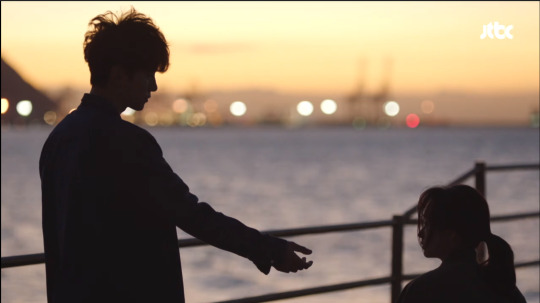

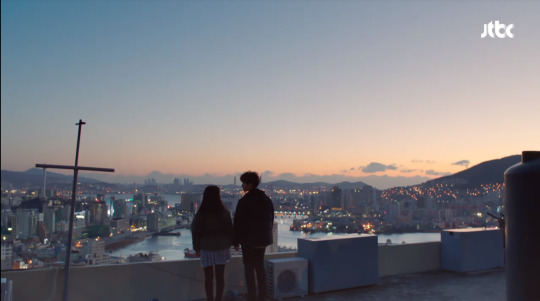
One of the biggest things that also stood out significantly to me, although maybe not that big of a deal, but definitely worth a mention, was how well her hand fit into his. I have never felt such a swell of emotions through people simply holding hands. I swear to god, it is as if their hands were made for each other. Her hands are perfectly smaller than his, which means his covered them effortlessly. “You were born to be loved by me, right?” asks Kang-doo. Some of his lines were honestly so cringey, but Jun-ho pulled them off so well, they seriously sounded really natural to me. 100% cute and 0% corny.

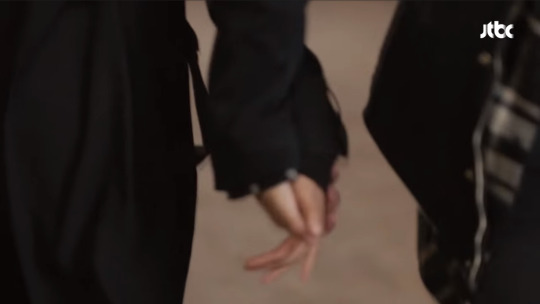

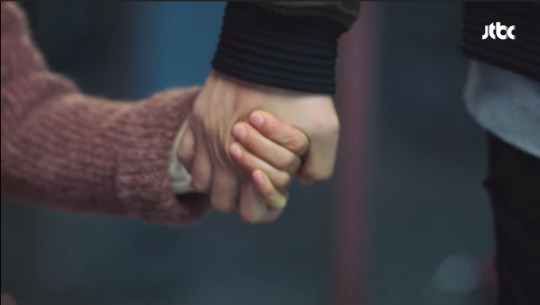
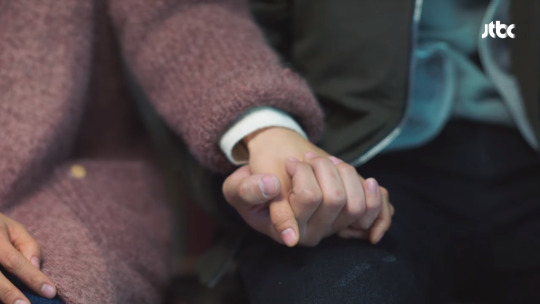
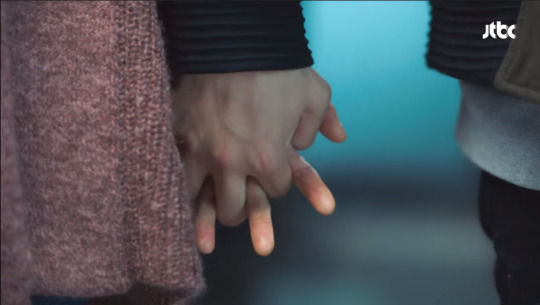
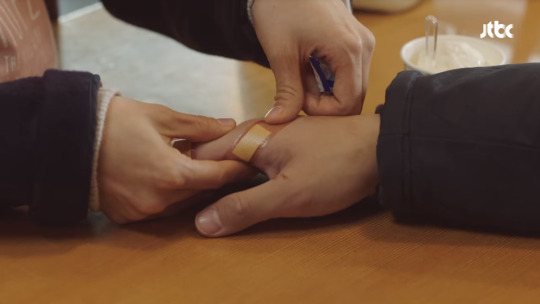

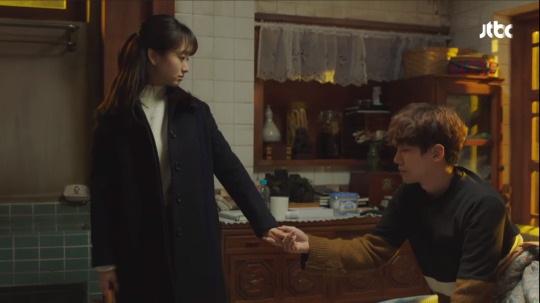
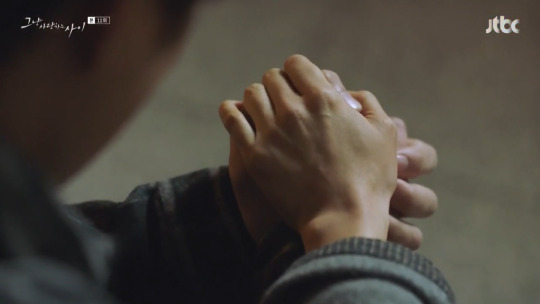
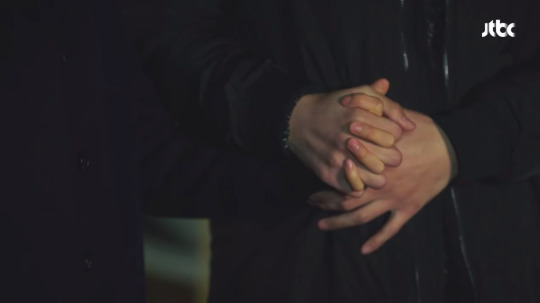



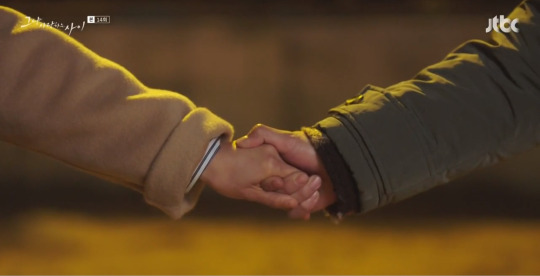
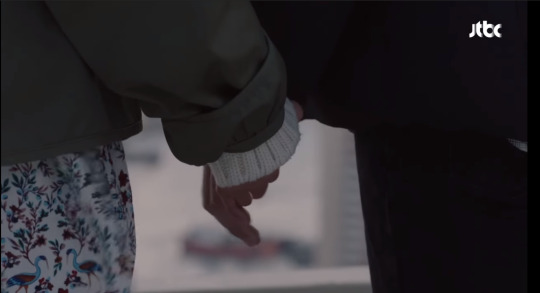
And of course, the iconic ice creams. The fact that by the end of the drama, Moon-soo herself actually likes ice cream, too, can it get any cuter. To add to the cuteness, in real life, Jun-ho is ice cream obsessed, always posing with it, talking about it, even writing a song about it, and of course, eating it. I feel like the symbol of ice cream was sort of like Jun-ho’s piece to take from Kang-doo. It is like a part of him that he gave to his character, to fully make it his, but not exactly him.
The carrot is iconic because of the one line we can never forget. The line that Moon-soo meant, but didn’t really mean at the same time. The line that sputtered out of her mouth in a funny, exasperating way, but also in a meaningful, deeper, heartfelt way. Me too, Moon-soo, me too. I like a man that eats carrots, too.
thank yous & i love yous & geu sa-i--
This motif was quite a prominent one, but after thinking about it more, I started to realize the sort of message the writer and director were possibly trying to get at. The “i love you”s were touching and cute and everything, but the line(s) that got to me the most were not those three stereotypically monumental words, but it was the “thank you”s that cut deeper than most. How many dramas have you watched where the couple consistently thanked each other? And what kind of meaning did those thank yous hold? In 그 사이, Moon-soo and Kang-doo exchanged genuine, heartfelt thank yous.
The thing with these thank yous though, is that they have a multitude of meanings. “Thank you for picking me up today.” “Thank you for calling me.” “Thank you for being there for me.” “Thank you for loving me.” “Thank you for being you.” “Thank you for staying by my side.” “Thank you for being alive.” I could go on and on, but you get the point. These thank yous meant the universe to them, they relayed a sort of gratitude and passion and sentiment that only these two could feel and share. It all just felt so organic.
Next, I want to discuss the “trope” that 그 사이 utilized in which Kang-doo was fighting for his life towards the end of it all. This part was excruciatingly painful to watch, mostly because I honestly couldn’t tell how they were going to end it all. Nor could I really understand what sort of meaning each kind of ending could have. If they ended it happily ever after, why? And if not, what else were they trying to say? I just couldn’t tell.
Kang-doo was suffering from a failing liver, and I think it only made sense. From day one, he is depicted as reckless, especially towards his own body. A comment somewhere on Dramabeans stated it nicely: “Grandma kept telling him to stop taking [the painkillers] and to let his pain out instead, and with no granny to give him placebos, he ended up taking real, strong painkillers.” I feel like 그 사이 toyed with Kang-doo’s life as a sort of reality check, that shit goes on, no matter how good or bad everything seems to be turning out, shit still goes on. But by saving him, of course, maybe they are telling us that miracles really do exist. Most importantly, they don’t forget to remind us that these miracles may come at the expense of others’ own misfortunes.
And if anything, the dragging out of Kang-doo’s potential death left room for the supporting to characters to come out and shower Kang-doo with love. I can’t remember the quote exactly, but it was when the doctor asked Jae-young what kind of person her brother was, that so many random people were coming forward to readily donate a part of their liver as if it was no big deal. But Ma-ri countered wonderfully, that it is a serious decision to make, which is all the reason why it matters so much more. It was super duper heartwarming to see everyone try their best, in any way, to help Kang-doo and just have him live. I feel like giving us the most plausible hope of Sang-man specifically, was symbolic in which he, of all people, literally the most profound, but possibly most childish person out of our entire bunch, would be the one to save Kang-doo. But it also felt brutally realistic when they suddenly took him away as a donor because life just doesn’t get to work out perfectly like that all the time. But also with last-minute miracles, life kinda does tend to work out at the perfect times. Life is luck? Maybe.
But the ending scene, that goddamn, fucking gorgeous ending scene. I don’t even care if people whine all they want about how ending with a kiss scene is cliche and overrated, just leave me be to pick this one apart. In fact, the part that got me the most choked up wasn’t even the kiss itself (I mean, it partly was), but it was the dialogue, the eyes, the expressions, and the voiceover that got me wailing like a drowning beluga whale in the middle of the Atlantic ocean. Like smack dab in the middle. Wailing incessantly. That was me.
Because here is the thing. First off, we pan into a frame that overlooks the Busan cityscape as the sun is setting, the bright houses are subtly flashing their hues, the horizon is glowing all sorts of reds and blues and pinks and oranges and purples, and our couple’s silhouette is situated perfectly at the center of it all. Literally, just that still frame of that scene itself, took my breath away. Stunning cinematography at its finest. Moon-soo tells Kang-doo that she loves him, which we haven’t gotten a chance to hear after all the times he’s already told her the same. But here she says it and her eyes are literally glowing, and his eyes are peaceful yet joyous at the same time, the most comfortable, and just the most at-home I have ever seen them throughout the entire series. And then there is a really long pause with no dialogue, no sounds, no loud blowing, just a blank, subtle, empty noise, as he cradles her face which somehow just manages to fit perfectly into his hand, and then Kang-doo’s voice breaks through the ever-so-slightly prolonged silence, and he narrates “Moon-soo loves me”.
I will repeat that just in case you couldn’t read it above: “Moon-soo loves me”.
The impact that this one simple line had was massive, colossal, unimaginably poignant, and it hit me. Deep. This one line, I feel, gave validation to this entire show, to all our hours devoted to watching it, to the characters’ actions, and most importantly, to Kang-doo’s life. Throughout the entirety of 그 사이, he is literally battling for his life, not only physically at the end, but emotionally and mentally as well. He very much lacked that spark of purpose, the thing that made him live. Not to denounce his worth and say that now his life only boils down to Moon-soo’s love for him. It’s more like, she gives him another beginning. Kang-doo states this eloquently when talking with Seo Joo-won on the roof about why he loves her. “Just because”. He continues, “I was a man that could only live by the day. But after meeting her, I was curious about tomorrow”.
And so “Moon-soo loves me” is so pivotal in which Kang-doo has mostly, hopefully relieved himself of all the shit and guilt and trauma and struggles that he has been fighting from within, and all he needs in his life to keep going is Moon-soo’s love. This line is followed up with a “The fact that we are alive… it is a relief.” How fucking beautiful is that.
And now, this is where I can come full circle to the title of this drama, “그냥 사랑하는 사이”. The English of this has been commonly translated as “Just Between Lovers”, but as you can tell since the beginning of this composition, I do not prefer to use that title, for several reasons. The main one is that, well, sometimes there are things in other languages that you really just cannot translate. “그냥 사랑하는 사이” is one of them. The meaning that it has in Korean, the feelings and implications that it carries with it, simply cannot be translated into the English language. If I wanted to try, it would be something along the lines of “just your average, simple relationship between two people that love each other”. Which still sounds pretty stupid in English, but with those extra strands of meaning, and even more added depth, is what the Korean title holds. Also, for simplicity’s sake, Korean phrases tend to be condensed into acronym-like words. In this case though, “그냥 사랑하는 사이 (geu-nyang sa-rang-ha-neun sa-i)” as an acronym-ish kind of word is simply “그 사이 (geu sa-i)” in which the “냥 (nyang)” and “사랑하는” (meaning “loving”) are removed to now signify something along the lines of literally: “that relationship” or “a relationship”. “그” is used as sort of an article, I guess, meaning “that” or “a”, or basically anything not really specific like his or hers or yours. **I have never learned Korean formally, and everything I’m saying is legitimately self-taught, so please don’t quote me on any of this, but I am just trying to get my point across as best as I can LOL** This all boils down to how, to me, “그 사이” is so simple yet touching and moving and so full of meaning, that it has this sort of immense, hidden beauty to it. Not only is it, in this case, a shortened version of “그냥 사랑하는 사이”, but “그 사이” as a phrase in any context is seemingly mundane, but carries so much more than meets the eye.

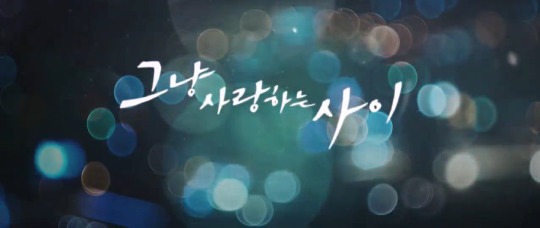
Just like, you know, a relationship. But not actually. The love part sounds simple enough, and it is. They love. But how they came to love, what it means to them, contains a meaning so deep and intricate that, maybe, just to make things easier and to even preserve its profound beauty that we will never understand, we will leave it as... just a relationship.
And I find that incredibly moving. I am struggling right now, to type down my feelings, but I hope that it is working to an extent. For the first time ever, a drama’s title actually seemed to fit, in less of a relevancy sort of way, but in much more of a meaningful, heartfelt way. The title of this drama is so short, so plain, almost boring-sounding, but it encompassed so much more than that. It encompassed an entire, full relationship of two people that come to love, or even more than love, but live, through pain and deaths and guilt and hardships and tears and growth and interdependence, and just each other.
There is an infinite amount of complexity hidden within the seemingly thin and obvious layers of 그 사이, and I think this is what is at the center of its ethereal beauty as a show for viewers to absorb. The words behind the characters’ actions and the events that occur carry immaculate weight, that it makes you question things, maybe even about your own life. This is a sort of art that I have never, ever seen a show demonstrate, and it completely took my breath away. It left a million pieces of my heart shattered on the floor. I literally feel like my life has changed, even if just a little bit.
Which now brings me to the things that this show wanted to tell the audience. When commenting about 그 사이, many people tended to say something along the lines of “It had great messages, it was so deep, etc.” and yes, I agree with that, too. But nowhere did anyone actually say what those messages were. I feel like there is an infinite number of lessons 그 사이 wanted to teach us, but I’ll try to point out the more noticeable ones first.
think about this--
Remember the forgotten.
Awareness is one of the strongest forces, because knowledge is power. I feel that, amidst people’s ordinary lives, we sometimes forget to remember those who simply never had a chance to live. We all live so voraciously and fervently, but it is important to be aware of that fervor that couldn’t be. Some people questioned the intent of leaving out the final product of the memorial that our two leads were working so hard on throughout the entire show. One commentator wrote simply: "In a way, it gave cadence to the idea that the memorial wasn't for the public or even us as the viewers. It belongs to the victims and the survivors of the tragedy." Very well articulated. Nothing more is needed.
Poverty kills.
I touched upon this one a little bit in the above text, but here, I’m just going to lay down Halmeoni’s entire spiel because no could have said it better than her.

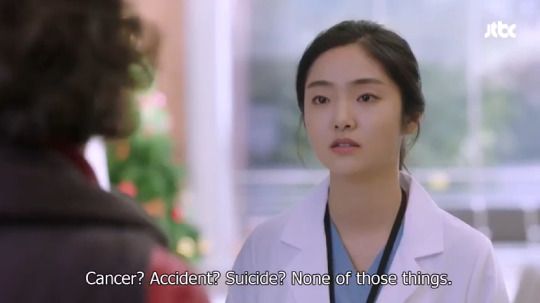


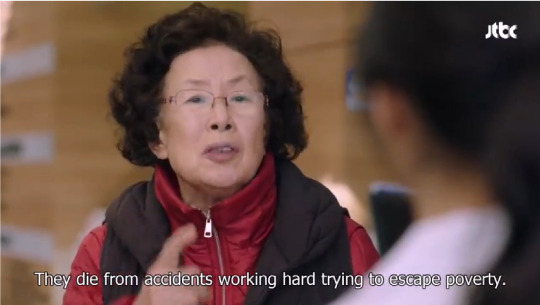

Mental trauma is in its own way, more painful than any physical sort of pain.
Jun-ho demonstrates this so hauntingly and beautifully through his acting as the broken Kang-doo. In an interview that Jun-ho had after wrapping up filming, he says, "I didn't know what these people thought. It's something you won't know if you haven't been through it. You have to experience pain to know what it feels like. So I didn't even dare to try to understand them. I just used my own method of shutting myself away”. So much personal heart and character lies within those words, making his performance even more credible and noteworthy. Here is a line from the wise ol’ Halmeoni that hits pretty deep.
Never take life for granted.
I feel like this sort of message has such redundancy and insensibility in common-day life, but it is a reality that 그 사이 brings to life gorgeously. These characters are struggling in the depths of their own despair on a daily basis. But in the end, we get to see them prevail in some sort of way, with the help of each other’s sheer existence. In the same interview, Jun-ho says, “You don't take things for granted. Every little thing from the sun and wind, is important.” It is so poignant, to see the actor himself connect so deeply with the plot and depth of the story itself. The ending scene of 그 사이 paints this message in the air and the wind, from Kang-doo’s very own voiceover. He says, “Because we survived… it’s a relief”. And that’s it. That concludes the entirety of 그 사이. What huge punch to the guts that line was. It was so bold, heart-rendering, and just true. It was true, that the simple fact that we are living our own lives, sad or happy, good or bad, pain or not, we are alive, and that is all that matters in the end.
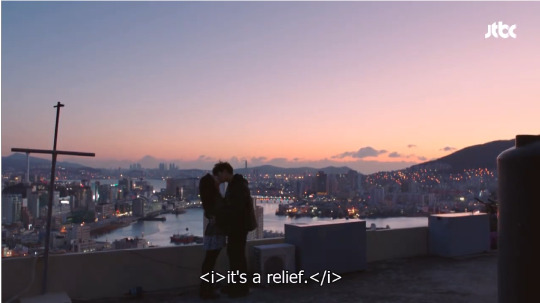
words & frames--
In addition, I want to include a few more lines (that are conveniently included within the beautiful OST MVs produced by El Music Studio) that struck huge cracks into my soul as they were spoken aloud on screen. Honestly, these lines sound much better in Korean because there is a sort of depth that an English translation isn’t able to capture, but that is okay. English will just have to do.

“Misery is just... being miserable.”
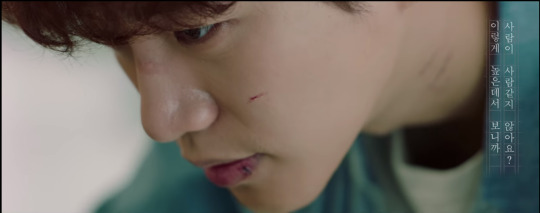
“Looking down from such a high place like this, people don’t really look like people anymore, do they?”

“Just because they are crying more loudly doesn’t mean that they are hurting more.”

“Him distancing himself that much shows how much he actually cherishes you.”
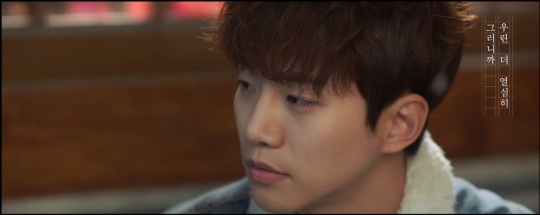
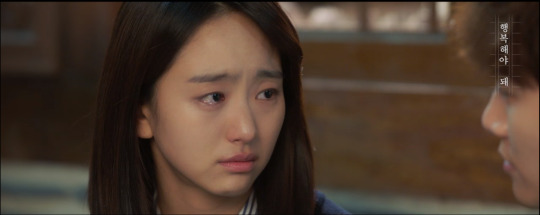
“And so, more than anyone else... we must be happier.”
An extra note about the OSTs: none of them stood out enough for me to add to my music library, not even Jun-ho’s very own (as much I love his gorgeous voice). However, I can confidently say that they added a haunting effect to many of the scenes and portrayals throughout the show. All the voices and quiet, heart-tugging melodies that meadered its way between the dialogue and echoes, created some intense emotions that probably would’ve been empty otherwise.
noticeable hair-growth & flaws & final wrap up--
One of the things that I really came to notice by the end of this show was that the characters’ hair had grown significantly. I mean, this is a given. Hair grows over time. Duh. But aside from the fact that it’s an obvious naturality. I found to love how it added to the realism in 그 사이. The fact that by the last episode, Jung Yoo-jin’s hair was almost reaching her shoulders, Seo Joo-won’s was creeping towards his neck, Moon-soo grew out her bangs and swept it to the side, and Kang-doo’s covered his eyes a little more than usual, was just a touching sight to take in. Look how human they are! Their hair grew properly, following the time sequence of the series itself. How beautiful is that. It’s such a subtle, minor detail, but to me, it really stood out as an aesthetic touch to its already-brimming-with-reality depiction that 그 사이 establishes.
I could be biased here, but I want to say that 그 사이’s biggest fault was that it used supporting characters like Seo Joo-won and Jung Yoo-jin. Not to say that their roles were completely useless or detrimental to the plot, but more like, their roles were underdone amidst the medley of such a strong leading pair mixed with the other complex, unique supporting figures. Although Jung Yoo-jin thankfully did not play your classic, snooty second female lead vying for the main man, Seo Joo-won very much fell under this category, in his own male-ish sort of way. I honestly did not really appreciate some of his actions and words. I felt like his character was lacking the depth and charm that the rest of the cast hones in on so well. The writers really could have given more to work with, but with such bland lines and cliche intentions, I just couldn’t find myself warming up to him. Aside from parts of Joo-won’s incompleteness as a character, I guess another flaw could be the classic kdrama tropes 그 사이 utilized. As minimal as they were, some were there regardless. The wrist grab, the mid-fall waist catch, the eavesdropping behind a wall, and all of that cliche mush you could find in 1897957 other kdramas, were definitely present in 그 사이. But whatever. It was fucking beautiful anyway.
Finally, I want to address the last part of this clean finale that 그 사이 managed with ease. In particular, it was the montage of the familiar locations that we have gotten to see since the beginning. Externally, it looked plain and a little bit sad and empty. But I feel like these stills offered us so much, because these locations were more than places that our characters frequented, but they are perpetual within their spaces of time. These places, those sort of “places that you can always go back to no matter what happens”. Places of rest, of heart, of everything else that has and could happen. At this point I’m basically just rambling, but my point is that. It was breathtaking.



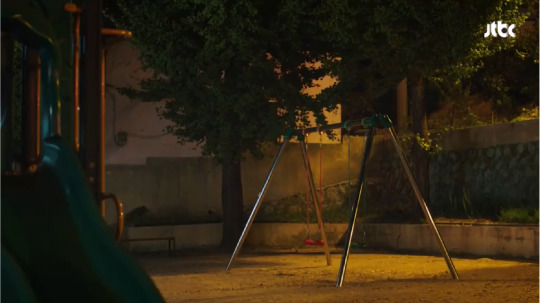

Also, let us just take some time to appreciate these real Busan visuals.
To anyone that has read this far by now… Wow. Just so you know, you have read through an entire 5-month journey with my thoughts LOL. It is almost May now and my life has been too much of a mess for me to be able to post this within one sitting.
Many days have passed since I last finished this drama and wiped my tears off my face and blew my nose into a soggy tissue and gazed awestruck into the beautiful skyline on my laptop screen. But my feelings remain the same, and this series has held such a special place in my heart. When talking about Korean dramas with friends or acquaintances I try to sound nonchalant about 그 사이. Because, you know, it was just that one show that lowkey changed my life. 그 사이 made me feel things and taught me things and provoked thoughts that no other show ever has in my life. I really could care less about what the general public had to say about 그 사이. I just know, I loved it with all my heart and soul. Thank you for everything, 그 사이.
#그냥 사랑하는 사이#just between lovers#rain or shine#korean drama#kdrama#review#lee kang doo is my bb 5ever#can they just get married ok#this drama stole a piece of me#love times infinity#i have exhausted all my words#see yall in my next rant (":
41 notes
·
View notes